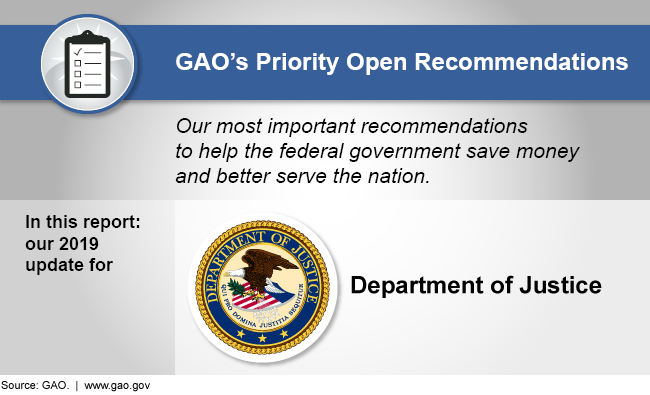Priority Open Recommendations: Department of Justice
Fast Facts
Each year, we make more than 1,000 recommendations to help improve the federal government. We alert department heads to the recommendations where they can save the most money, address issues on our High Risk List, or significantly improve government operations.
This report outlines our 14 priority open recommendations for the Department of Justice as of April 2019.
The recommendations relate to technology, immigration courts, and FBI whistleblower complaints.
Since our previous letter in April 2018, the Department of Justice implemented 2 of our priority recommendations.

Graphic showing that this report discusses GAO's 2019 priority recommendations for the Department of Justice
Highlights
What GAO Found
In April 2018, GAO identified 13 priority recommendations for the Department of Justice (DOJ). Since then, DOJ has implemented 2 of those recommendations focused on increased data collection efforts and tracking to determine the effectiveness of key DOJ initiatives. Specifically, DOJ initiated additional data collection and data evaluation efforts to measure the performance of U.S. Attorneys' Offices in determining whether the department's charging and sentencing policies were being effectively implemented.
In addition, prior to discontinuing its Clemency Initiative, the department took steps to reform its management of the initiative, including increasing staffing to meet the demands of the initiative, prioritizing the review of certain petitions, and streamlining the review process. In April 2019, GAO identified 3 additional priority recommendations for DOJ, bringing the total number to 14. The recommendations address management challenges in the immigration court system.
DOJ's continued attention to these issues could lead to significant improvements in government operations.
Why GAO Did This Study
Priority recommendations are open GAO recommendations that warrant priority attention from heads of key departments or agencies because their implementation could save large amounts of money; improve congressional and/or executive branch decision making on major issues; eliminate mismanagement, fraud, and abuse; or ensure that programs comply with laws and funds are legally spent, among other benefits. Since 2015, GAO has sent letters to selected agencies to highlight the importance of implementing such recommendations.
For more information, contact Charles M. Johnson, Jr. at (202) 512-8777 or johnsoncm@gao.gov.
